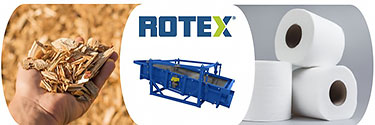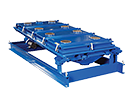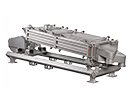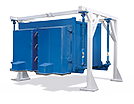Case Studies and Technical Articles
How have other companies — including Fortune 500 brands — used Rotex industrial screeners?
Rotex’s Sustainable Wood Screening for Pulp and Paper Production

Rotex’s Sustainable Wood Screening for Pulp and Paper Production.
Rotex has been an innovative pioneer in the technological development of screening machines and industrial separation equipment since 1844. Check out this article where Lawrence Rentz, President of Rotex, walks through how the company’s equipment supports pulp and paper production while helping to minimize energy consumption.
Click here to download this article as a PDF.
As a young co-op maintenance engineer working for Kimberly-Clark Corporation in Fullerton California, I learned early in my career the importance of producing high-quality paper. From the paper used for books to bandages used in health care, there is no denying the many ways paper can positively impact our lives. However, paper production can consume large amounts of natural resources, making it all the more important that downstream equipment suppliers to the paper industry (like Rotex) play a role in helping conserve energy for its customers.
The U.S. is the second largest paper producer in the world. The pulp and paper industry is the fifth largest user of electricity in the US, and uses large amounts of water every year. This creates a unique challenge for those whose products are used in downstream operations.
Typically found in the wood yard of a pulp and paper mill, Rotex’s BM&M equipment is used to screen wood chips to optimize the efficiency of our customer’s operation. Our Chip Screener (CS Model) sizes wood particles during the early stages of the process; right after wood goes through a chipper and right before the wood chips are entered into the digester. The digester serves as a pressure cooker that dissolves the wood chips to free the fibers which are converted into pulp.
By leveraging our high efficiency CS Model, the company is able to reduce the wood fines in the process. By reducing the fines from 1.5% to 0.5% at a state-of-the-art paper mill that produces 2300 tons per day of pulp or 2000 tons per day of white paper, the following results are possible:
- Chemical consumption in the digester can be reduced by approximately 3%.
- Water consumption potentially reduced by around 3,500 gallons per day.
- As a fringe benefit, the additional wood fines retrieved from the CS Model can then be used either for energy for the boilers or for biomass pellets.
Screening creates a more efficient paper making process, further reducing energy consumption and manufacturing costs. As an innovative pioneer in the technological development of screening machines, Rotex’s high efficiency equipment sets the standard for similar wood screening equipment. Minimizing energy and water consumption in the pulp and paper production process further extends the positive impact of Rotex within both the industry and community.



